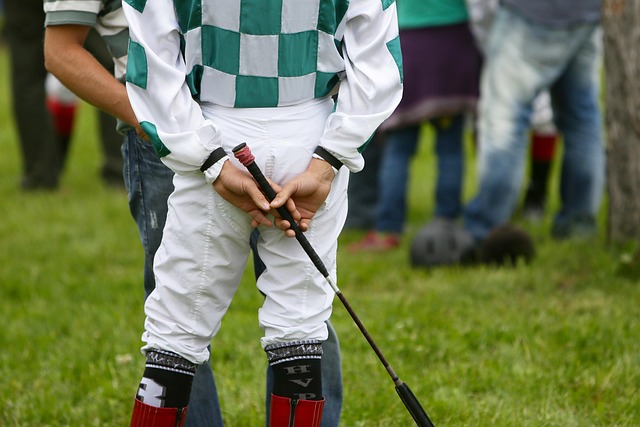Share This Article:

Safety at Work
Lexington, KY (WorkersCompensation.com) – When Armando Rivera participated in the Run the Bluegrass half-marathon this May, it wasn’t the way he used to race.
Years ago, Rivera was a jockey. But an injury during morning workouts left him partially paralyzed. Not a paraplegic athlete, Rivera has raced in more than 50 races across the country to bring attention to the Permanently Disabled Jockey Fund (PDJF), the only fund some jockeys can turn to when they face permanent disability after a workplace injury.
“Currently we have about 50 jockeys on our rolls,” Joe Clabes, executive director for the PDJF, said. “Historically, we’ve had around 50 or 60 jockeys at any one time, but they have to meet our very stringent requirements.”
Jockeys are not employees of the track they’re racing on. Nor are the employees of the owner of the horse they ride. Jockeys are paid a contracted rate by the horsemen’s bookkeeper (the person who handles financial transactions and ensures smooth operations for trainers and owners at a track), according to the Jockeys Guild, a jockey’s advocate organization in Lexington, Ky. Because they are contracted workers, they don’t qualify for workers’ compensation.
If they’re injured on the job, a spokesperson for the guild said, they may get temporary disability payments from the guild – if they’re a certified jockey and if they’re a guild member. Medical costs and injuries are typically covered by the track’s insurance, the guild said.
And being a jockey is a dangerous profession.
“Any race could have a catastrophic injury,” Clabes said. “
That’s evident given the injuries to jockeys over the past few months.
In May, Declan Cannon suffered a back injury after he was thrown from his horse at Churchill Downs. Officials said Cannon was riding Rebel Red in the turf and had to steady his mount when another horse stopped suddenly as it neared the far turn and backed up into the field. Cannon was thrown to the turf after his horse clipped the heels of another horse.
Cannon suffered hairline fractures to two of his vertebrae, and a small fragment that came off one of the vertebrae. Doctors said Cannon will have to be out of work for six weeks as he recovers.
In March, Kazushi Kimura suffered a lower leg injury in the starting gate at Santa Anita Park. Another jockey, Francisco Martinez, broke his ribs in a spill at Parx which will require three months to recover. Last year, jockey Emma Jayne Wilson was injured during a race at Woodbine. Officials said the horse she was riding had a cardiac event and died while Wilson was on him in the midst of the race. When he stumbled, she was sent catapulting over his head. Wilson hit the metal inner rail at full speed. she suffered a broken neck as well as multiple fractures to her pelvis and sacrum. Since then, she’s been recuperating and rebuilding her strength and expects to return to riding this year.
It's not just during races that a jockey can be injured. Some jockeys ride during morning workouts and the horses can throw riders as well. In November 2024, Benny Landeros was doing morning workouts in Oklahoma City’s Remington Park, when his mount tossed him to the ground. Landeros was hospitalized and diagnosed with some fractured ribs and a small fracture in his neck.
Jockey injuries are common in horse racing and falls are a major cause. Injuries can range in severity from minor bruises to serious fractures and head injuries. Jockeys can suffer crushed legs when horses shift in the starting gate or be trampled if they’re throw on the track in front of other horses. Organizations like the PDJF and the Jockeys guild provide support to jockeys who have been injured.
Clabes said the PDJF provides monthly stipends for the jockeys who are permanently disabled of about $1.500 a month. However, those stipends don’t begin until the jockey has been disabled for two years. The Jockeys’ Guild provides stipends for those jockeys who are members of the guild and who are injured and can’t work.
The money for the PDJF comes from donations, Clabes said. But the organization is working with horseman’s groups to get payments made into the fund by taking a small portion of winning purses.
Rivera's half-marathon was a way to help people understand that jockeys need help when injuries happen.
“We need people to know we exist and that there’s a need to support these fallen riders,” Clabes said.
AI california case file caselaw case management case management focus claims compensability compliance compliance corner courts covid do you know the rule employers exclusive remedy florida glossary check Healthcare hr homeroom insurance insurers iowa leadership medical NCCI new jersey new york ohio pennsylvania roadmap Safety safety at work state info tech technology violence WDYT west virginia what do you think women's history women's history month workers' comp 101 workers' recovery Workplace Safety Workplace Violence
Read Also
- Feb 27, 2026
- Frank Ferreri
- Feb 26, 2026
- Frank Ferreri
About The Author
About The Author
-
Liz Carey
Liz Carey has worked as a writer, reporter and editor for nearly 25 years. First, as an investigative reporter for Gannett and later as the Vice President of a local Chamber of Commerce, Carey has covered everything from local government to the statehouse to the aerospace industry. Her work as a reporter, as well as her work in the community, have led her to become an advocate for the working poor, as well as the small business owner.
Read More
- Feb 27, 2026
- Frank Ferreri
- Feb 26, 2026
- Frank Ferreri
- Feb 25, 2026
- Liz Carey
- Feb 25, 2026
- Anne Llewellyn
- Feb 24, 2026
- Chris Parker
- Feb 24, 2026
- Frank Ferreri




